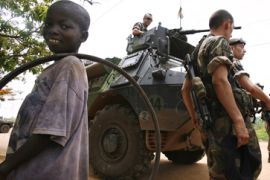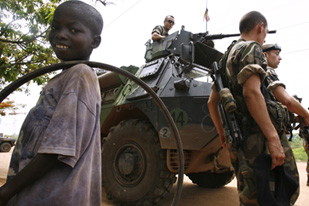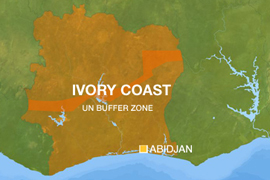Q and A: Ivory Coast conflict
Al Jazeera takes a look at the issues behind the conflict.

 |
| French soldiers are to begin withdrawing from buffer zone that divides the Ivory Coast [AFP] |
As the UN begins withdrawing its troops from the buffer zone between government and rebel-held areas, Al Jazeera takes a look at the reasons behind the conflict.
Why did the conflict erupt?
Following independence from France in 1960, Ivory Coast enjoyed more than 40 years of prosperity and relative stability.
But tensions between the Muslim north and Christian south were exacerbated by an economic downturn that began in the mid-1990s.
Large numbers of immigrants had settled in the north of the country during its prosperous years and, as things got tougher, they were blamed for its problems.
Northern Muslims complained of discrimination and Alassane Ouattara, a popular northern leader, was banned from running in the 1995 elections under a controversial nationality law.
Under the law, only those with two Ivorian parents could claim citizenship whether they were born there or not.
Violence began to erupt and a series of coup attempts culminated in September 2002 in an attack on the city of Abidjan by dissident soldiers in an attempt to overthrow the government of Luarent Gbagbo.
That sparked more than four years of on-off fighting, with the ‘New Forces’ rebel groups gaining control of the north.
Negotiations
In January 2003, rebels were brought into the government in a deal backed by France. In May, rebel groups and the government agreed to a total ceasefire to be policed by French and African troops.
That broke down in March 2004 after 120 people were killed when government troops fired on an anti-Gbagbo protest.
In April 2005, the rebels and Gbagbo agreed at peace talks in South Africa to end the war.
After two years of negotiations, Gbagbo and Guillaume Soro, the rebel’s leader, signed a peace deal in March this year and Soro was appointed prime minister of a transitional government in April.
France’s role
As the former colonial power, France has been heavily involved in the conflict.
 |
It already had 600 soldiers in the country under a bilateral agreement before the outbreak of civil war and that increased to 3,000 as the fighting worsened.
Thousands of French citizens have also been evacuated from the country during the war.
Both the government and the rebels have accused France of supporting the other side.
In November 2004, government planes attacked the rebel town of Bouake, killing nine French peacekeepers in the process.
France responded by destroying a large part of the Ivorian air force – a move which led to anti-French riots in government-controlled areas.
Gbagbo’s supporters have continued to accuse the French of backing the rebels.
UN presence
The UN established a presence in Ivory Coast in 2003 and its 7,000 troops, alongside French peacekeepers, have created a buffer zone between the north and south of the country in an attempt to keep the two sides apart.
It has been involved with peace talks and has backed the current peace deal.
The deal has led to the formation of a transitional government and for the holding of elections within 10 months.
An amnesty has already been granted to those accused of war crimes during the conflict.
Ivorian troops are set to take over from UN and French peacekeepers along a border between north and south that will replace the current buffer zone.
Future
Ceasefires and peace deals have been broken before and election deadlines have previously passed without a vote. So Ivorians are sceptical about the chances for peace.
The underlying causes of the conflict remain and the divisions between the north and the south have deepened after four years of seperation.
Lower taxes levied by rebels have made goods cheaper in the north, but the cocoa trade in the south remained uninterrupted during the years of war, maintaining its economic advantage.
And analysts say key issues such as the nationality law and disarmament still seem a long way from being resolved.